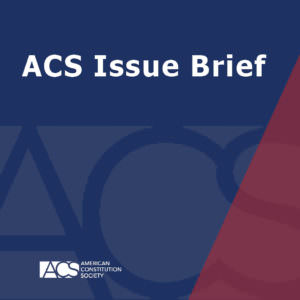Addressing the Epidemic of Domestic Violence in Indian Country by Restoring Tribal Sovereignty
Professor of Law and Director of the Indigenous Law and Policy Center, Michigan State University College of Law
March 23, 2009
 ACS is pleased to distribute an Issue Brief by Matthew L.M. Fletcher, Director of the Indigenous Law and Policy Center and Associate Professor at the Michigan State University College of Law, entitled, “Addressing the Epidemic of Domestic Violence in Indian Country by Restoring Tribal Sovereignty.” In this Issue Brief, Professor Fletcher argues that American Indian women residing on Indian reservations suffer from domestic violence and physical assaults at rates that far exceed those faced by other women, and that the perpetrators of these crimes often go unpunished. Professor Fletcher contends that the current state of federal Indian law has contributed to this epidemic of domestic violence in Indian Country. The author first notes that the Supreme Court has held that tribal governments do not have jurisdiction over domestic violence misdemeanors committed by non-Indians in Indian Country, and second that although federal and state authorities may prosecute these crimes, they often do not do so because of a lack of resources and other factors.
ACS is pleased to distribute an Issue Brief by Matthew L.M. Fletcher, Director of the Indigenous Law and Policy Center and Associate Professor at the Michigan State University College of Law, entitled, “Addressing the Epidemic of Domestic Violence in Indian Country by Restoring Tribal Sovereignty.” In this Issue Brief, Professor Fletcher argues that American Indian women residing on Indian reservations suffer from domestic violence and physical assaults at rates that far exceed those faced by other women, and that the perpetrators of these crimes often go unpunished. Professor Fletcher contends that the current state of federal Indian law has contributed to this epidemic of domestic violence in Indian Country. The author first notes that the Supreme Court has held that tribal governments do not have jurisdiction over domestic violence misdemeanors committed by non-Indians in Indian Country, and second that although federal and state authorities may prosecute these crimes, they often do not do so because of a lack of resources and other factors.
Professor Fletcher explains that among the traditional powers retained by Indian tribes under tribal sovereignty is the power to establish tribal courts and to prosecute criminal offenders for acts committed within Indian Country. He notes that traditionally, tribal sovereignty is inherent and undiminished unless the tribe has voluntarily divested itself of some aspect of its sovereignty or if Congress has affirmatively acted to divest the tribes of a part of their sovereignty. He argues, however, that the Supreme Court unilaterally changed these rules when it held that Indian tribes may be divested of their sovereignty by implicit divestiture (by Supreme Court decree). The Supreme Court has held that tribal governments do not have jurisdiction over domestic violence misdemeanors committed by non-Indians in Indian Country, leaving Indian women who are the victims of domestic violence and physical assault by non-Indians in Indian Country in a quandary when federal and state authorities do not prosecute these crimes, which they often are not able to do.
The Issue Brief proposes that Congress ameliorate this situation by enacting legislation that recognizes tribal court jurisdiction over domestic violence and related misdemeanors committed by non-Indians in Indian Country. Under Professor Fletcher’s proposed plan, tribal prosecutions for these crimes would proceed as do other tribal prosecutions. The author proposes that Congress condition the recognition of tribal sovereignty on a requirement that Indian tribes provide adequate constitutional and criminal safeguards. Professor Fletcher concludes that Congress has the constitutional authority to untie the hands of Indian tribes and permit them to once more enforce criminal laws against non-Indians in Indian Country and stop the epidemic of violence against Indian women.
Read the full Issue Brief here: Addressing the Epidemic of Domestic Violence in Indian Country by Restoring Tribal Sovereignty
